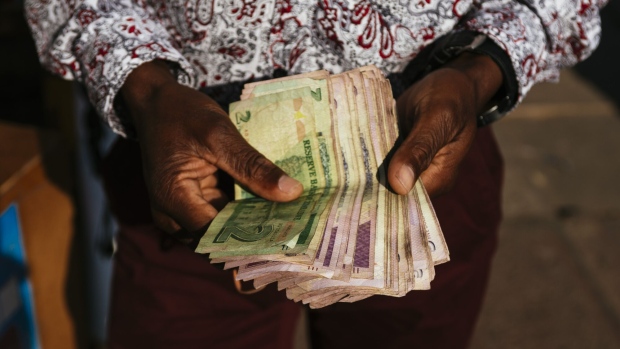Jun 12, 2023
IMF Wants Zimbabwe to Take Further Steps on Currency Reforms
, Bloomberg News

(Bloomberg) -- The International Monetary Fund has urged Zimbabwe to take further steps on currency reform, after the southern African nation stopped short of free-floating its local dollar.
The credibility and effectiveness of the recent measures by authorities will depend on the “swift resolve” to liberalize the foreign-exchange market with a view to transition to market-based price discovery, the Washington-based lender said in an emailed response to questions.
The Reserve Bank of Zimbabwe last week eased curbs to the foreign-exchange market, saying it will pursue a “market-determined” exchange rate instead of reliance on a weekly auction, as it attempts to end volatility that has plagued the economy for several weeks. As a result, stocks have surged more than 600%, and inflation is rising amid a wave of price hikes on basic goods.
The move, however, stopped short of a free-float for the Zimbabwe dollar. The central bank said it will maintain “parameters.” These include setting the floor price for dollar sales and the sale of foreign currency to banks for onward sale to their clients, in order to establish an interbank market.
The recent measure by authorities aimed at establishing an interbank market is welcome, the IMF said. “However, the parallel rate continues to depreciate,” an IMF spokesperson said.
Read More: Zimbabwe Stops Just Short of Currency Free-Float Amid Plunge
A Zimbabwe dollar trades on the interbank market for 5,487 per US dollar. Black market exchange rates on Monday ranged between 6,200 to 6,700 Zimbabwe dollars per greenback, according to ZimPriceCheck.com and ZimRates.com, websites which monitor the rates.
“A convergence of the official and unofficial exchange rates is possible if the authorities accelerate the liberalization of the foreign-exchange market, address the Reserve Bank of Zimbabwe’s quasi-fiscal operations to mitigate liquidity pressures and maintain an appropriately tight monetary policy stance to durably restore macroeconomic stability and ensure social stability,” the IMF said.
Read More: Next Africa: Practice What You Preach Is Lesson for Zimbabwe
©2023 Bloomberg L.P.






